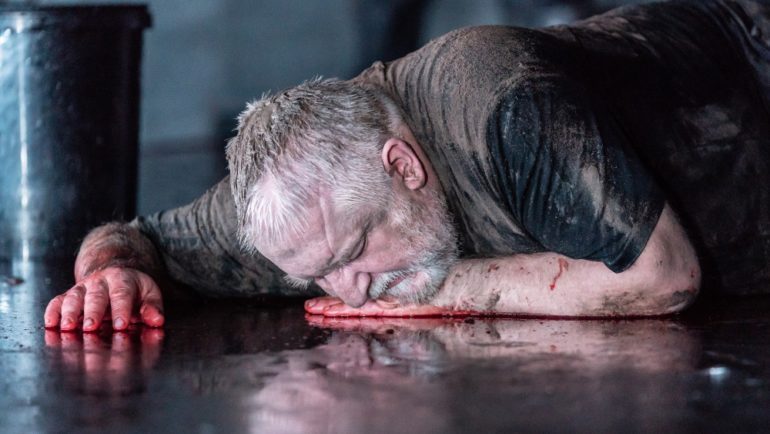London Theater Review: ‘The Tragedy of King Richard the Second’
By Matt Trueman
LOS ANGELES (Variety.com) – Political plotting has become a national pastime in Britain. Hardly a week goes by without an attempted parliamentary coup. “The Tragedy of King Richard the Second,” Joe Hill-Gibbins’ stark distillation of “Richard II” starring a superlative Simon Russell Beale at the Almeida Theatre, keys into that febrile climate of treachery and mistrust. With courtiers circling his crown like vultures, Russell Beale’s Richard becomes a paranoid, panic-stricken king: a monarch so wary of defenestration and, with it, death that his reign seizes up as if rigor mortis had set in. A leader caught in the headlights, a ruling class waiting to strike, a nation gripped by paralysis — what could better encapsulate Brexit Britain?
Not that Hill-Gibbins’ production is pat. This is a psychological study of power and its accompanying perils. Stripped back to a skeletal plot that can, admittedly, be hard to follow, Shakespeare’s most poetic history play becomes a political thriller — a tale of how to topple of a king. Leo Bill’s dead-eyed Bollingbroke returns from exile with a revolutionary fervor, homing in on Richard’s crown like a heat-seeking missile. But he and his supporters must pick their moment or else their treacherous efforts will mean their deaths. With nobles nipping at the king’s heels, testing their strength then retreating into the crowd, this becomes a twitchy, jittery staging, always on edge. The pulse of war drums gets under the skin and designer Ultz’s iron-grey box set offers no escape. It turns civil war into a cage-fight to the death.
Beginning at the end, with a dethroned Richard philosophizing in jail, Hill-Gibbins gives the play a Taoist twist. Is this a man who dreamed himself king, or a king who wakes to find himself a man? The difference between the two states is slight — a simple gold crown that, here, seems to have teeth. The second Russell Beale slips it on, Richard’s mortal vulnerability vanishes into stately authority. Its presence gives him absolute power — the ability to affect the world with a word. Subjects fall silent whenever he speaks and, on his say-so, rebels like Bollingbroke can be instantly banished.
It is an unnatural position, as Russell Beale makes brilliantly clear. Instead of the usual ill-equipped king, too meek to find the mettle required to rule, his Richard is simply in an impossible fix. He is, effectively, in a snake pit surrounded by vipers and, though he preaches peace outwardly, he snaps viciously at anyone who might step out of line. Adopting a princely posture, hands on his regal hips, it’s not that he’s ineffectual, but that he’s outnumbered, fighting potential foes on all sides.
By framing Richard’s courtiers as a chorus rather than distinct characters, Hill-Gibbins shifts the center of the play. The six-strong ensemble see-saws between Richard and Bollingbroke, from royalists to rebels, huddling like a flock of flamingos as if wary of stepping away from the safety of the pack. Isolated traitors wind up dead, modishly sploshed with a slop-bucket of stage blood. Instead, they cling to the walls, desperate not to be seen, and scatter like sparrows that have spotted a crow. Yet they are all waiting, primed, for an opportunity to strike, sometimes snaking up to the king, sometimes snapping like hyenas. But they’re an unruly bunch, bickering between themselves, and their in-fighting triggers a wonderfully silly set-piece as glove after glove gets thrown down and political plotting descends into a playground free-for-all.
There’s a reason Richard’s crown looks a lot like a snare. It’s a trap — a target every monarch wears on their head. Indeed, the crown contains a contradiction: the absolute power it confers is outweighed by the vulnerability it brings with it. As its wearer, Russell Beale can only wait, gloomily fatalistic, to be knocked from his perch, and when he sits on the ground to “tell tales of dead kings,” he’s not burying his head in the sand so much as facing up to his reality. He makes leadership look like a cruel form of psychological torture, where no one can be trusted and nothing seems real. Britain’s imperiled and incapacitated prime minister must know just how he feels.
It’s something Bill’s Bollingbroke discovers for himself. So steadfastly thuggish in opposition, he wilts when he gets his hands on the crown, wary even of putting it on. It adds a grim inevitability to the play’s final moments, as his loyalists call out the names of potential opponents he’s had dispatched in quick and chilling succession. Power is precarious unless it’s made absolute. “Uneasy lies the head that wears the crown” — as does the nation waiting on its word.

